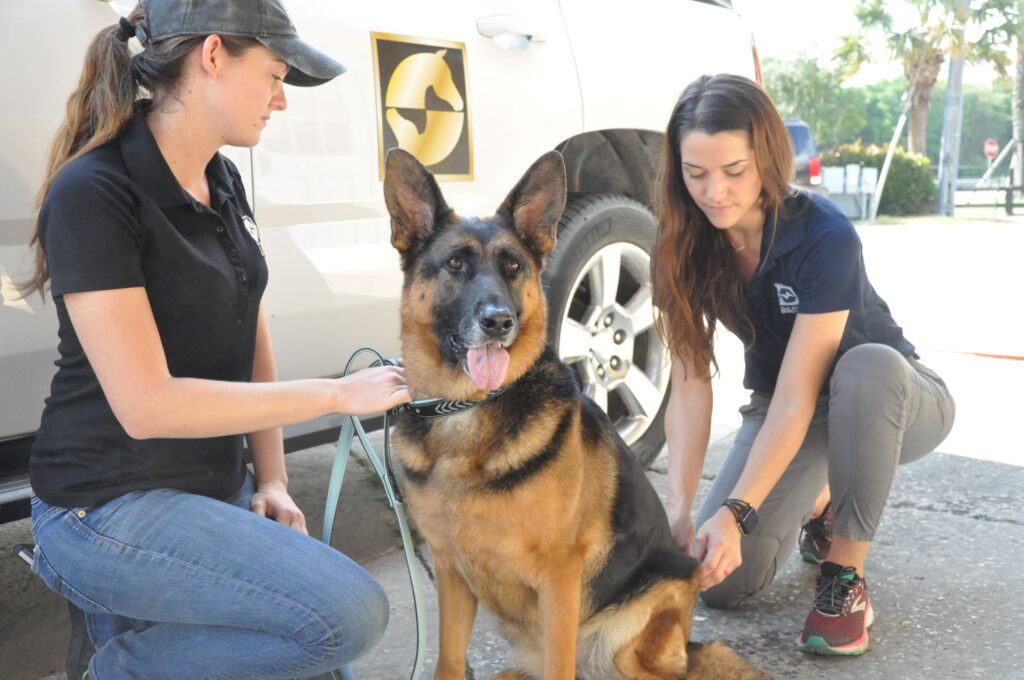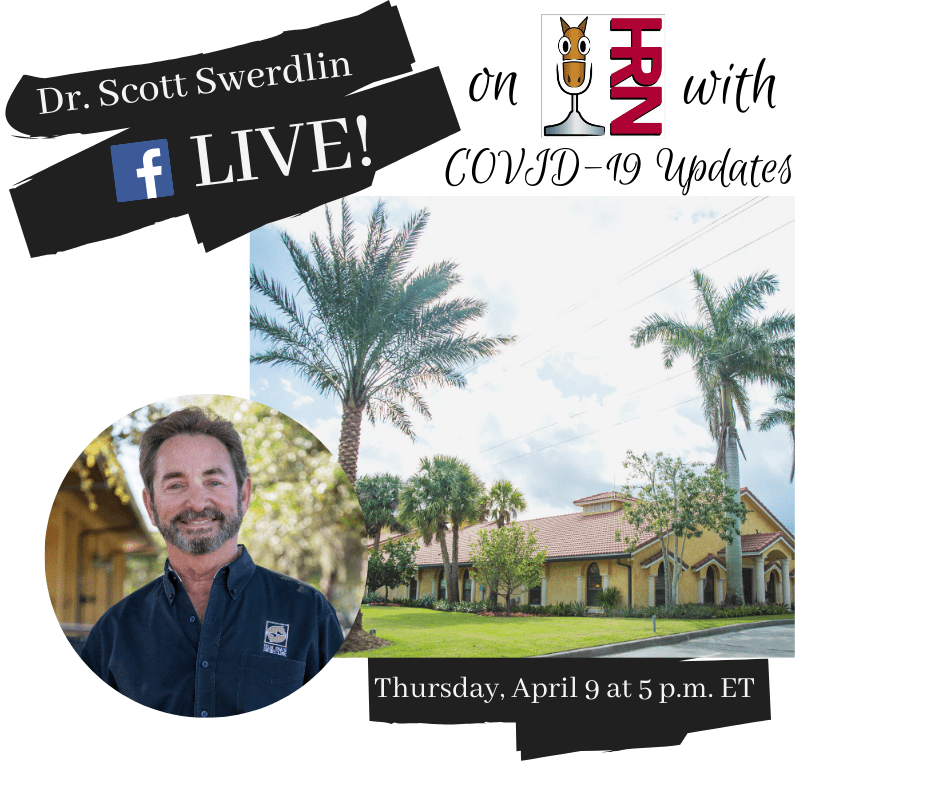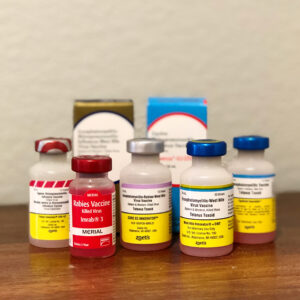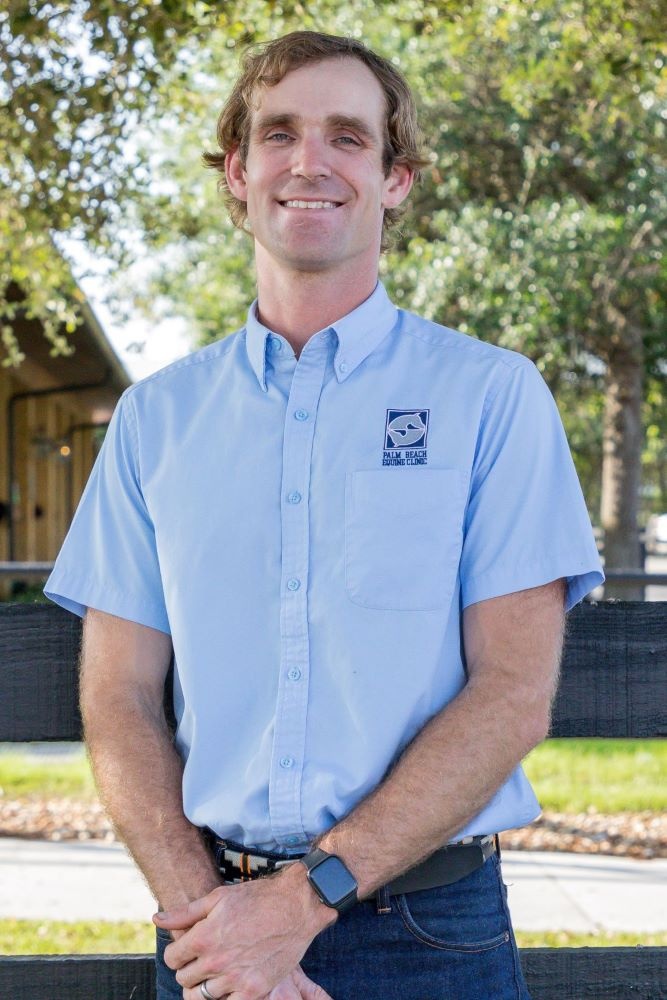Month: March 2020
No matter what life may bring, our pets are here for us.
And Palm Beach Equine Clinic is here for them.
In our commitment to the health, safety and wellbeing of our patients, clients and community, Palm Beach Equine Clinic is expanding to treat all four-legged members of your family.
Whether you are concerned for the health of yourself, your loved ones, or simply doing your part to flatten the curve, our team of veterinarians is here to help by prioritizing the the health of your animals.
Save yourself from the stress and risks associated with taking your pet to the veterinarian. Please contact Palm Beach Equine Clinic for your small animal veterinary needs. A team of Palm Beach Equine Clinic veterinarians is able to care for your pets through select small animal veterinary services during this unsettling time.
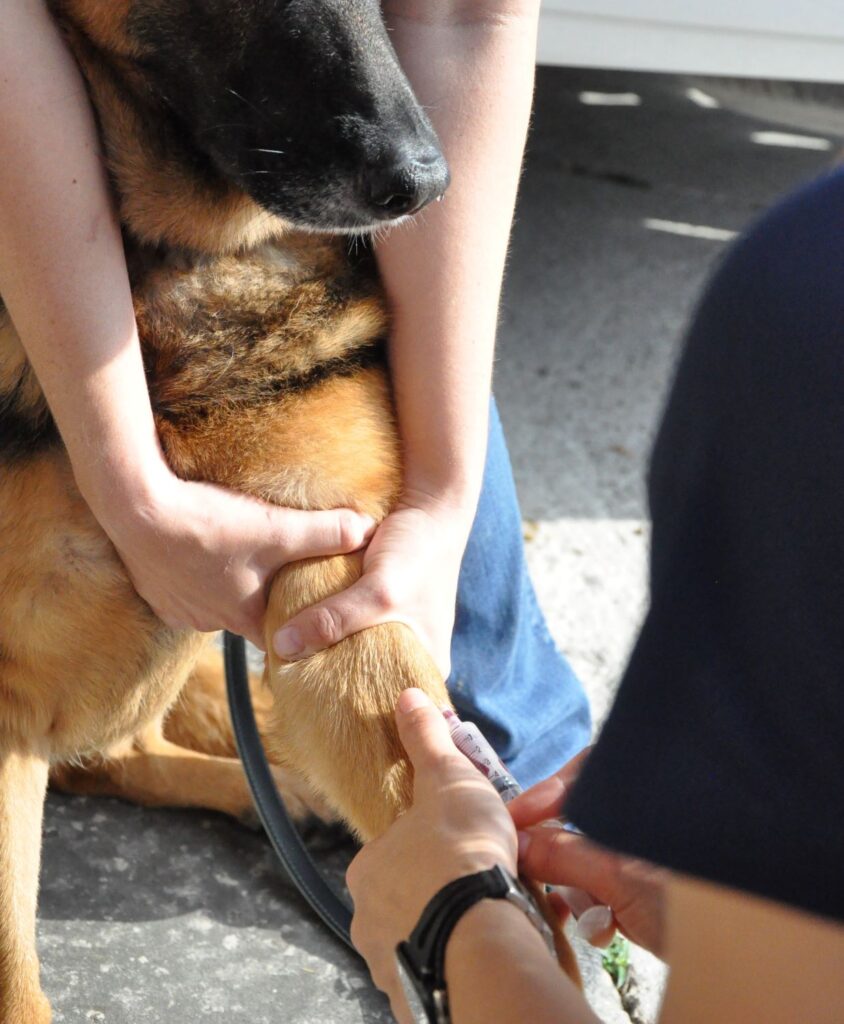
Here for the Health of All Barn Critters
Whether at Your Farm or at the Clinic
- Vaccinations
- Bloodwork & Fecal Testing
- Select Medications (such as heartworm or flea and tick treatments)
- Physical Exams
- Acupuncture

Don’t hesitate to ask your Palm Beach Equine Clinic veterinarian about the care of your pets. We are here to support you and your animals, and can provide accommodations to safely tend to your pets.
Call Palm Beach Equine Clinic for questions regarding your pets at 561-793-1599.
Updated April 24, 2020
In an executive order issued March 20, 2020, Florida Governor Ron DeSantis has directed all non-essential businesses in Palm Beach County to close. As a veterinary hospital, Palm Beach Equine Clinic is an essential business and will remain open.
Palm Beach Equine Clinic is committed to the care of equine patients and will continue providing care. Our equine hospital, laboratory, and diagnostic departments are fully functioning, expertly staffed, and equipped to treat any type of equine health condition. A Palm Beach Equine Clinic veterinarian is always available in the event of an emergency, 24 hours a day, seven days a week.
While our doors remain open to support clients through this distressing time, Palm Beach Equine Clinic is taking precautions to prevent the spread of COVID-19.
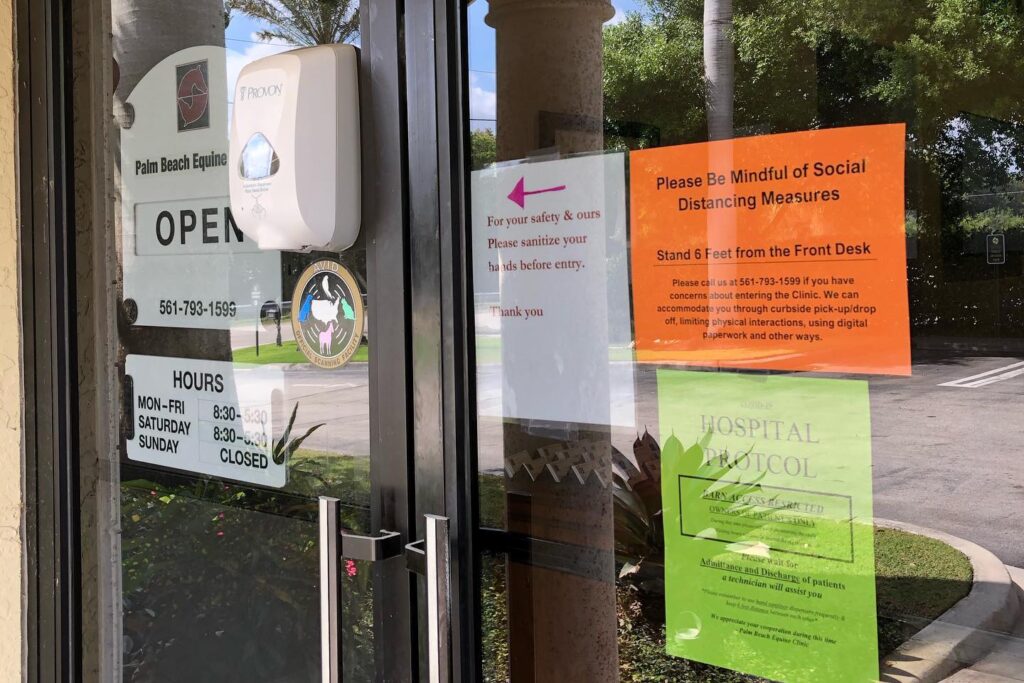
We greatly appreciate the cooperation and encourage those with concerns to call ahead so our team can safely accommodate you and your animals. Preventative measures such as curbside pickup/dropoff, digital paperwork, limited physical interactions, and other safety protocols are being implemented.
Palm Beach Equine Clinic Coronavirus Safety Protocols
- We ask that all visitors wear a protective mask/covering. Anyone on the property, whether in the lobby or hospital, must wear a mask to protect themselves and our staff.
- Hand sanitizers have been posted to our main doors and we encourage all clients to take a pump before entering the clinic.
- Hospital visiting hours have been limited to 8 a.m. to 5 p.m. Please speak with your PBEC veterinarian or call 561-793-1599 for any questions or clarification regarding visiting your horse at the hospital.
- Hospital access is restricted to owners of intensive care patients only.
- Owners are only permitted in the hospital for patient pick up and drop off. Please wait for patient admittance and discharge so a technician can safely assist you.
- As standard medical practice, Palm Beach Equine Clinic continues to implement high-level disinfection and sterilization of medical equipment and devices. To ensure our staff and clients are kept safe, stricter cleaning protocols have been implemented throughout the Clinic and will remain in place for the foreseeable future.
- Please limit the number of individuals present during your horse’s appointment. Our veterinarians are equipped with skilled technicians to handle your horse.
- Please be cognizant of social distancing measures even if you have no signs of illness. Please practice social distancing while at the clinic by keeping at least 6 feet apart from others. We have posted signs, laid down boundary lines from our front desk, and our staff is doing their part to physically separate from clients as best as possible.
- If you or a family member are not feeling well, suspect you have been exposed to COVID-19, or have recently traveled to areas with active COVID-19 transmission, please call the front desk at 561-793-1599 to reschedule your horse’s appointment or arrange for another person to be present at the appointment.
- We encourage horse owners and barn managers to be prepared in the event that they or their staff becomes ill and cannot care for their horse. Having a dependable backup caretaker for your horse and organizing clear instructions on feed, medications, exercise and general care is crucial to preparedness planning.
Palm Beach Equine Clinic continues to stay up to date on COVID-19 developments and will update our clients, partners and fellow equestrians as the situation progresses. Contact Palm Beach Equine Clinic at 561-793-1599 for questions or to speak with a veterinarian.
Additional Coronavirus Resources & News for Veterinary Clients
A View 6-Feet from the Track
Dr. David Priest comments on veterinary life amid COVID-19 and specifically on its impacts in…
Care for Our Horses and Equestrians Amid COVID-19
The following information was requested by the Village of Wellington and posted at https://www.wellingtonfl.gov/767/Equestrian-Information By…
Coronavirus & Veterinary Medicine on Horse Radio Network
Dr. Scott Swerdlin talks COVID-19, equine veterinary medicine, and horse industry impacts with The Horse…
Hunkering Down? We’re Here for You & Your Pets
No matter what life may bring, our pets are here for us. And Palm Beach…
Dr. Scott Swerdlin Discusses His Thoughts on Being Strategic About Your Horse’s Health During the COVID-19 Pandemic
As we all know, the United States Equestrian Federation has suspended all points and ratings for the immediate future as a result of the coronavirus (COVID-19) pandemic. This unfortunately resulted in the cancellation of the Winter Equestrian Festival, Adequan Global Dressage Festival, and major equestrian competitions around the world. However, this does not mean that all riding and training must come to a halt.
For the health and safety of ourselves and our loved ones, we must follow recommendations from the Center for Disease Control and Prevention to help reduce the spread of COVID-19. We are fortunate that Wellington, specifically the Equestrian Overlay Zoning District, is not a high-density area. Wellington offers picturesque bridle paths, idyllic weather and an abundance of expertise in all facets of the equine industry. Now is a unique opportunity for those who have been occupied by hectic schedules to take a step back, de-stress and even enjoy social distancing by saddling up and exploring the endless miles of excellent bridle paths.
Let’s make the most of our time in Wellington while awaiting the unclear future of the COVID-19 pandemic by continuing to ride and train our horses. Let’s try to keep a degree of normalcy in our daily routines and use this time wisely by improving both horse and rider health and well-being. Let’s use this time to ensure our horses remain in peak performance and ready to resume competition schedules when that time arrives.
Avenues for Enhancing and Maintaining Optimal Equine Health
It is vital for teams to have a veterinarian by their side keeping a close eye on the equine athlete’s health, performance and well-being. Closely monitoring a horse’s condition is key to catching potential injuries before they progress into issues that require more serious treatments. Here are some recommendations to consider incorporating during this break in competition that may benefit your horse when its time to step back into the show ring.
Preventive Medicine
Now is a perfect time to update your horse’s vaccinations and make sure your horse is ready to step back onto the showgrounds when competition resumes. Spring equine vaccinations to consider include:
- Encephalomyelitis, Eastern (EEE) and Western (WEE)
- Influenza
- Rhinopneumonitis (Herpesvirus)
- West Nile Virus
- Rabies
- Tetanus
- Strangles
For horses returning to areas where Potomac Horse Fever exists, a booster for that disease is highly recommended. Ensuring your Coggins test and records are up to date is always beneficial. For questions regarding equine vaccinations, please call Palm Beach Equine Clinic at 561-793-1599 to speak with a veterinarian.
Maintenance & Regenerative Medicine
Allowing our equine athletes to thrive while extending their performance careers may require Sport Horse Medicine to improve their comfort, well-being and performance. Many horses benefit from having their hocks, stifles, and/or coffin joints injected. Horses must be thoroughly evaluated by a sport horse veterinarian to determine the necessity and potential benefit of maintenance medicine before any corticosteroid injection is administered.
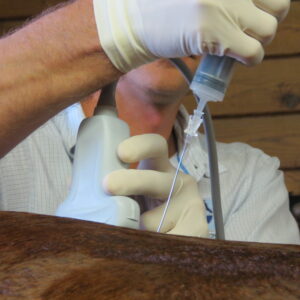
To further address the wear and tear incurred from intense training and competition, Regenerative Medicine is a non-steroidal option for activating and enhancing the horse’s innate bodily healing process. Palm Beach Equine Clinic offers advanced regenerative therapies for treating musculoskeletal injuries, osteoarthritis or degenerative joint disease.
- Platelet Rich Plasma (PRP)
- Interleukin-1 Receptor Antagonist Protein (IRAP)
- Autologous Conditioned Serum
- Pro-Stride Autologous Protein Solution
Alternative Therapies
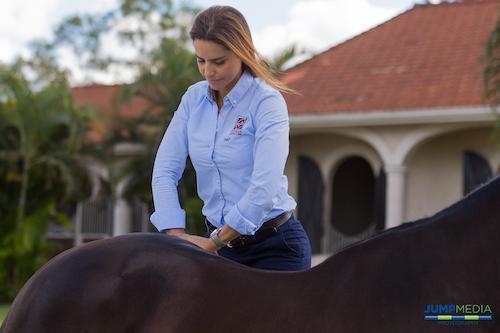
Employing a holistic approach to treating patients, Palm Beach Equine Clinic offers veterinarians with a wealth of expertise in Alternative Medicine. Alternative therapies are often used in conjunction with traditional medicine and can be uniquely tailored to enhance a horse’s performance and overall health.
- Equine acupuncture and electroacupuncture
- Veterinary chiropractic manipulations
- Laser therapy (from low-level to regenerative laser options)
- Shockwave therapy
- Chinese Herbal Medicine
Reproduction & Fertility
Now may be the perfect time to plan for a future competition partner by breeding your horse. Palm Beach Equine Clinic is proud to offer highly successful Embryo Transfer program. Utilize this time to begin the breeding process by having your mare safely bred through artificial insemination, with the embryo collected 7-8 days after pregnancy. A detailed Breeding Soundness and Fertility Evaluation can jumpstart your future show ring champion. Palm Beach Equine Clinic provides veterinarians with expertise in Advanced Reproductive Services and Fertility Solutions, including:
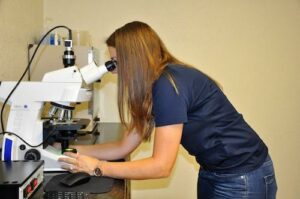
- Stallion or Mare Breeding Soundness and Fertility
- Embryo transfer: an ideal option for mares with busy competition schedules
- Genetic cloning (geldings, mares or stallions)
- Artificial insemination and semen collection, freezing, storage and shipping
Palm Beach Equine Clinic remains open and fully equipped with a team of 40 veterinarians, 60 technicians, fully stocked pharmacy, all-inclusive equine hospital and surgical suites. Speak with a PBEC veterinarian about your horse’s health and performance by calling 561-793-1599.
To Address Raised Concerns
The spread of the novel coronavirus has raised serious concerns as the status of the virus continues to evolve. As equine veterinarians, Palm Beach Equine Clinic is here to clarify questions raised regarding the potential impact of this disease in the equine industry.
Coronaviruses include a large group of RNA viruses that cause respiratory and enteric symptoms and have been reported in domestic and wild animals. Equine Enteric Coronavirus and COVID-19 are both coronaviruses, however, they are distinctly different viruses.
The Center for Disease Control and Prevention (CDC), infectious disease experts, and multiple international and national human and animal health organizations have stated that at this time there is NO EVIDENCE to indicate that horses could contract COVID-19 or that horses would be able to spread the disease to other animals or humans. Equine enteric coronavirus and COVID-19 are NOT the same strains and there is no indication that either are transmissible between species.
Therefore, it is important to concentrate on the health of our equestrians by being precautious and following recommendations from public health officials. Palm Beach Equine Clinic will continue to make every effort to stay informed of developments with COVID-19, and will continue to provide veterinary care to all horses regardless of the status of this disease.
A Profile of Equine Enteric Coronavirus
Equine coronavirus is an enteric, or gastrointestinal, disease in the horse. There is NO EVIDENCE that equine enteric coronavirus poses a threat to humans or other species of animals.
- Transmission: Equine coronavirus is transmitted between horses when manure from an infected horse is ingested by another horse (fecal-oral transmission), or if a horse makes oral contact with items or surfaces that have been contaminated with infected manure.
- Common Clinical Signs: Typically mild signs that may include anorexia, lethargy, fever, colic or diarrhea.
- Diagnosis: Veterinarians diagnose equine enteric coronavirus by testing fecal samples, and the frequency of this disease is low.
- Treatment and Prevention: If diagnosed, treatment is supportive care, such as fluid therapy and anti-inflammatories, and establishing good biosecurity precautions of quarantining the infected horse. Keeping facilities as clean as possible by properly disposing of manure will help decrease the chances of horses contracting the virus.
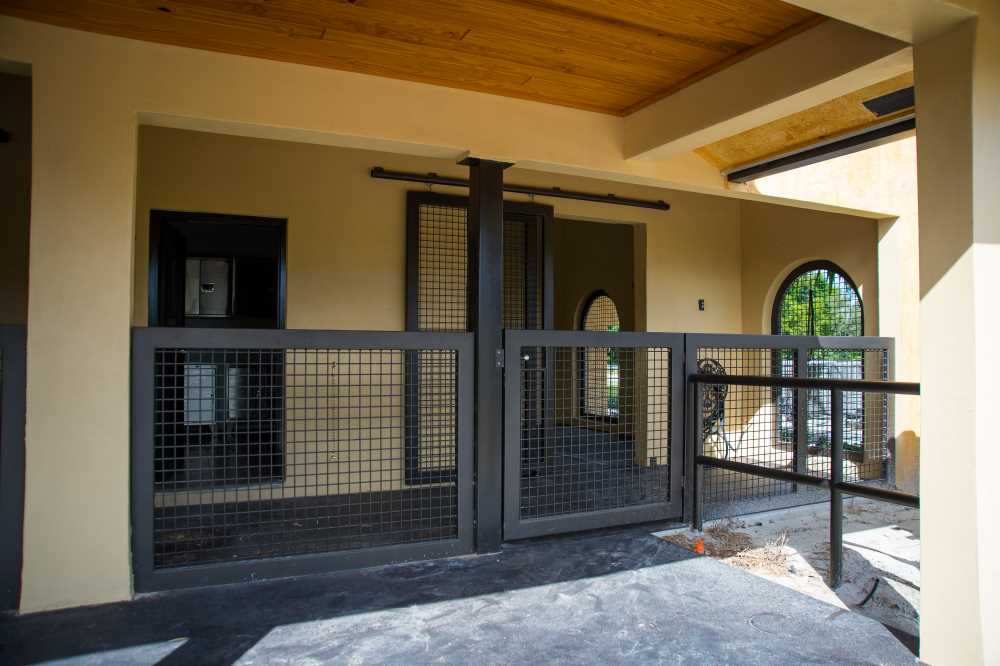
Information for this notice was compiled using the following sources:
Cornell Animal Health Diagnostic Center: https://www.vet.cornell.edu/animal-health-diagnostic-center/veterinary-support/disease-information/equine-enteric-coronavirus
American Association of Equine Practitioners, Equine Disease Communication Center: https://aaep.org/sites/default/files/Documents/Outside%20Linked%20Documents/DiseaseFactsheet_Coronavirus.pdf
Dr. David Priest Utilizes Dynamic Endoscope and Performs Surgery to Help Four-Year-Old Harness Racer Get Back in Action
For equine athletes to perform their best, optimal respiratory health is crucial, and particularly paramount for harness racehorses. According to Dr. David Priest, Palm Beach Equine Clinic veterinarian with a keen interest in respiratory health, a racehorse moves roughly 70 liters of air through its lungs over the duration of one second while exercising. To simulate the movement of that amount of air outside the anatomy of a horse’s body, it would require two industrial ShopVacs on full power.
A colloquial condition known as “roaring”, or recurrent laryngeal neuropathy, is a fairly common issue among horses, and it restricts the amount of air able to reach the lungs through the horse’s upper respiratory system. The condition usually affects the left side of the larynx – the equine left recurrent laryngeal nerve is longer than the right – with paralysis that does not allow for an adequate amount of air to travel to the lungs.
According to Dr. Priest, equine anatomy plays a factor in the prevalence of this condition. There is a correlation with the length and size of the neck to the nerve pathways that travel from the brain to the chest, around the heart, and back up to the throat. Although mild cases of recurrent laryngeal neuropathy can be tolerated, the condition becomes particularly serious when a horse’s work involves high-intensity aerobic exercise.
“We often see recurrent laryngeal neuropathy described as a paralyzed flapper,” said Dr. Priest. “If you imagine the flaps of the larynx as cabinet doors, then the horse should be able to hold the doors open without problem while at rest. Yet, when the airflow picks up during exercise, that muscle is sometimes not strong enough to hold the doors open, and it collapses into the airway.”
Just before the start of 2019, Dr. Priest received a call from Stephanie Reames, the trainer of a four-year-old harness racehorse with symptoms pointing to recurrent laryngeal neuropathy. During his diagnostic process, Dr. Priest performed an endoscopy while the horse was resting to provide a baseline observation.
“I saw what I thought was a minor abnormality, but I did not know what amount of laryngeal strength this horse had,” said Dr. Priest. “The roaring noise usually occurs when the disease is progressive, and this horse was making a little bit of noise.
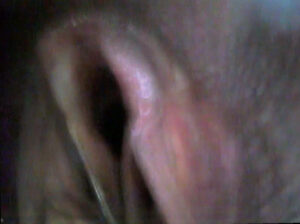
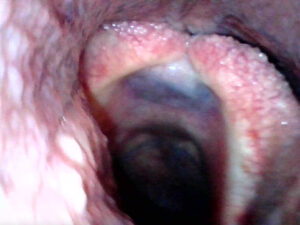
“This particular horse was in training for the harness racing season, so the owners and trainer wanted to figure out the root of the issue as swiftly as possible,” continued Dr. Priest. “The most effective way to accomplish that is to utilize a dynamic endoscope.”
A dynamic endoscope is a video recording device worn by the horse during exercise. It allows veterinarians to see the larynx, and therefore view signs of recurrent laryngeal neuropathy in real-time. Dr. Priest observed the disease as a grade C on the universal grading system for rating the disease, which translates to a full collapse of the left larynx flap.
Once diagnosed, Dr. Priest recommended an aptly-named laryngeal tie-back surgery, which involves stitching the larynx flap to surrounding cartilage in order to hold it open for optimal airflow. He performed the surgery at Palm Beach Equine Clinic a couple of days after making the diagnosis, and the horse returned home to its training base at South Florida Training Center in Lake Worth, FL, the same day.
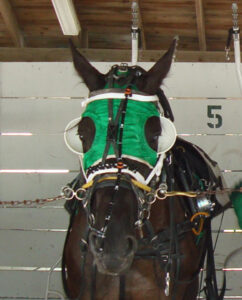
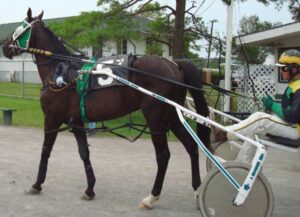
The suggested recovery time is 30 days to allow for the surgical incisions to heal. Once healed, this horse immediately returned to full harness racing training.
“The horse is doing fantastic and we are hoping to qualify for racing in the next three weeks, and we will most likely head north to Pennsylvania to race,” said Reames. “Dr. Priest is absolutely amazing and was extremely professional from start to finish. There is always a hesitation when you learn that a horse needs surgery, but Dr. Priest was so prompt with the diagnosis and procedure, and the horse healed so quickly. We have high hopes for another successful racing season!”
In February of 2020, Dr. Priest performed a second dynamic endoscopy to observe the condition and effectiveness of the tie-back surgery. “The disease usually results in a 20-30% reduction in airflow, which causes a small performance decline resulting in a speed reduction of maybe one second. This horse’s particular case was perfect at the one-year check, which is key because that one second can be the difference between winning and losing!”
